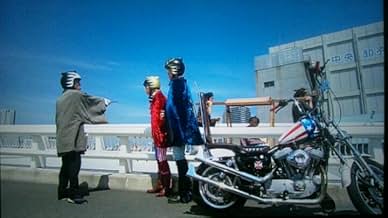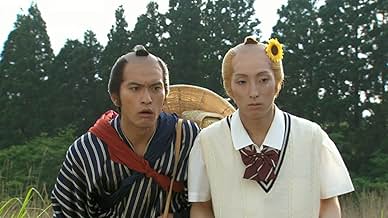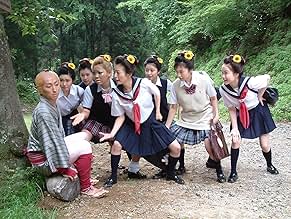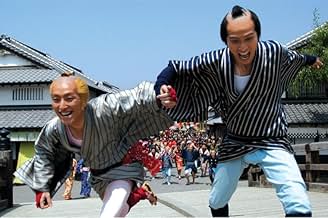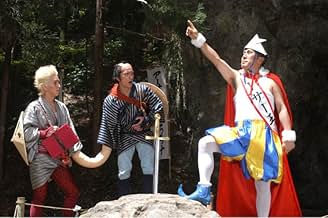Yaji and Kita are two men who live in Edo. They are deeply in love. Yaji is married to a woman, while Kita is an actor addicted to various drugs.Yaji and Kita are two men who live in Edo. They are deeply in love. Yaji is married to a woman, while Kita is an actor addicted to various drugs.Yaji and Kita are two men who live in Edo. They are deeply in love. Yaji is married to a woman, while Kita is an actor addicted to various drugs.
- Director
- Writers
- Stars
- Awards
- 1 nomination total
Arata Iura
- The Bartender
- (as Arata)
- Director
- Writers
- All cast & crew
- Production, box office & more at IMDbPro
Featured reviews
One of those strange films that I like but find difficult to say 'why' exactly. Surreal, touching, bizarre, obscure, confusing, culture-bound - but also laugh-out-loud funny in parts. Having read other reviews I am not sure how much of the film I got, but this film had its moments, including strong performances all round, a distinctive look and feel based on clashing modern and Edo themes and strong primary colours, and a convincing love story propping it all up. I'd recommend it to anyone who has spent any time in Japan or feels an affinity with the place. I can only guess at what audiences with no experience of Japan would make of it. Probably not very much...
Don't watch this movie. Or at least, if you do, prepare for disappointment. Yes, you may have heard this movie is brilliant. It may be, but you and I won't get it. This is a movie made for the Japanese, and unless you're well versed in Japanese pop-culture, you won't get the vast majority of the jokes. And I mean VERY well versed - not just an occasional J-pop fan or even a manga or anime freak. Many of the jokes in this movie are obscure Japanese pop-culture references that even the typical Japanese person won't get. Yes, the subtitles will help you follow the plot, but the plot is largely irrelevant, as most of the humor depends on pop- culture references that are impossible to convey to a foreign audience. And, as an earlier reviewer mentioned, there are a few Japanese-language puns that you won't get either. Don't worry, these wouldn't be funny if you did get them, unless you have the same quirky appreciation of puns as the Japanese. But the bulk of the humor here isn't language-specific, it's culture-specific, and even if you speak Japanese you could be left clueless.
Think of it as a Japanese version of The Simpsons or Spaced - for someone who doesn't get the pop-culture references, it would be difficult to appreciate the brilliance of these shows. Yaji-san and Kita-san is probably brilliant in much the same way, but without the cultural background, it comes off at best as just bizarre, and at worst as just juvenile silliness.
That said, it isn't hard to appreciate Yaji-san and Kita-san's absurdist roots, and fans of Rosencrantz & Guildenstern Are Dead or even Monty Python should be able to appreciate the spirit if not the content of Yaji-san and Kiya-san. In fact, for Python fans, there are even a few times when you may find yourself laughing while your Japanese friends sit and wonder what's so funny - watch for a clever reference to Monty Python's Search for the Holy Grail, for example. These times are few and far between, however, and for the most of the film you will probably just find yourself scratching your head, wondering what the hell is going on.
Michael
Think of it as a Japanese version of The Simpsons or Spaced - for someone who doesn't get the pop-culture references, it would be difficult to appreciate the brilliance of these shows. Yaji-san and Kita-san is probably brilliant in much the same way, but without the cultural background, it comes off at best as just bizarre, and at worst as just juvenile silliness.
That said, it isn't hard to appreciate Yaji-san and Kita-san's absurdist roots, and fans of Rosencrantz & Guildenstern Are Dead or even Monty Python should be able to appreciate the spirit if not the content of Yaji-san and Kiya-san. In fact, for Python fans, there are even a few times when you may find yourself laughing while your Japanese friends sit and wonder what's so funny - watch for a clever reference to Monty Python's Search for the Holy Grail, for example. These times are few and far between, however, and for the most of the film you will probably just find yourself scratching your head, wondering what the hell is going on.
Michael
Yaji and Kita is a film that, as one other reviewer wrote, was definitely written for the Japanese. It's legendarily filled with pop culture references, including plenty of ones obscure enough to throw even a native Japanese viewer, and has its share of language jokes too. While you may pick up on some of those, chances are good that most of them will pass you by completely. My wife and I caught only a handful of them, and chances are you'll catch a few yourself, but you won't get them all.
But it doesn't matter. In the end, the reasons why many Japanese viewers thought this film was brilliant will be lost on most Western film fans - but like all good films, this one isn't relying on just pop culture and language to make you laugh. The film is full of outright humor that DOESN'T get lost in translation; from the very beginning to the very end, this film was making us laugh. What's lost in translation just isn't enough to stop this film from being great, great fun! I usually loathe musicals, but the musical set pieces in this film are just outright hilarious.
If you enjoy bizarre humor, especially visual gags, then you'll get a kick out of Yaji and Kita : The Midnight Pilgrims. The characters are very bright, very colorful and very vivid, and the humor is extremely off the wall, imaginative and playful. There's a story underneath it, and although the film never discards it, it's really about the comedy. The film featured a fair few respected actors, and their talents help to make every small piece of this movie worth a watch - from start to finish, there are set-piece situations and running gags that will keep you laughing and smiling.
We may never see this film the way a Japanese watcher would...but so what? It's great anyway!
But it doesn't matter. In the end, the reasons why many Japanese viewers thought this film was brilliant will be lost on most Western film fans - but like all good films, this one isn't relying on just pop culture and language to make you laugh. The film is full of outright humor that DOESN'T get lost in translation; from the very beginning to the very end, this film was making us laugh. What's lost in translation just isn't enough to stop this film from being great, great fun! I usually loathe musicals, but the musical set pieces in this film are just outright hilarious.
If you enjoy bizarre humor, especially visual gags, then you'll get a kick out of Yaji and Kita : The Midnight Pilgrims. The characters are very bright, very colorful and very vivid, and the humor is extremely off the wall, imaginative and playful. There's a story underneath it, and although the film never discards it, it's really about the comedy. The film featured a fair few respected actors, and their talents help to make every small piece of this movie worth a watch - from start to finish, there are set-piece situations and running gags that will keep you laughing and smiling.
We may never see this film the way a Japanese watcher would...but so what? It's great anyway!
Be sure not to miss this most irreverent "jidai-geki" (period piece) from first-time director Kudo Kankuro. Loosely based on an earlier movie about two men escaping their wives, the postmodern treatment of the subject is indeed a treat. As one critic in Japan commented, the director must have been drunk while filming -- offbeat isn't quite the word, and off-the-wall goes only so far. But if you've ever wanted to see Tetris with dead people floating down the river on rafts, anachronism at the most unexpected times, or just shut off your brain and enjoy a movie which is really impossible to follow, Yaji and Kita's Midnight Pilgrimage will not disappoint. It's half-serious way of dealing with, in the best road movie traditions, two gay lovers, one a drug addict popping blue pills, make their way from medieval Edo to Ise and then when you least expect, burst out the absurd (motorcylces, TV shows, modern-day Tokyo). The translations occasionally fell flat (since the movie includes a lot of verbal jokes in Japanese) or were just plain unintelligible, but watching the miniature Tamiya tankers roll by needs no translations. So, sit back and enjoy the ride.
This is the story of two samurai in Edo period Japan who are in love. One is married, the other is a drug addict. They decide that in order to make things better they will go on a trip to Ise Sanctuary, where its presumed, everything will be made right. What happens once they get on the road is the movie and its as wild and wacky as anything your likely to see. There are numerous puns, both visual and verbal; we get bodily function jokes; gender bending characters; gay jokes;romance; spoofs of films and music (and musical numbers); trips through time and space; a search for "my reality"; drug induced hallucinations and other things I was laughing to hard, or too shocked to noticed. Its a movie made for the film makers and whom ever will click into their strange mind set. Frankly its hard to describe what happens since much of it is so out there that to hear about it out of context will not make any sense (office girls on parade? Zombie Bartender? Born to be Gay?).Its probably more fun to discover the weirdness on your own, besides its too hard to describe simply.
The film is not perfect. Its over two hours and probably could be trimmed by twenty minutes. The film also gets rather bizarrely surreal and it becomes almost too much to take. There is only so much one can take in before one hits the over load button. You probably won't like or get every joke or reference, I didn't, but I have to give it points for keeping at the craziness at all costs.
Still for those are open to crazed, silly/clever films that the term "off beat" is too weak a word. Actually this film is so crazy that there is a good chance it will never even find its well deserved cult.
9 out of 10 for sheer originality and audaciousness. Actually it would probably be something about an 8.5 but I have to round up or down to whole numbers. If you you're into off beat films and original visions look no farther this is the real deal. If you can't handle anything even slightly off center stay away, far away.
A unique cinema experience.
The film is not perfect. Its over two hours and probably could be trimmed by twenty minutes. The film also gets rather bizarrely surreal and it becomes almost too much to take. There is only so much one can take in before one hits the over load button. You probably won't like or get every joke or reference, I didn't, but I have to give it points for keeping at the craziness at all costs.
Still for those are open to crazed, silly/clever films that the term "off beat" is too weak a word. Actually this film is so crazy that there is a good chance it will never even find its well deserved cult.
9 out of 10 for sheer originality and audaciousness. Actually it would probably be something about an 8.5 but I have to round up or down to whole numbers. If you you're into off beat films and original visions look no farther this is the real deal. If you can't handle anything even slightly off center stay away, far away.
A unique cinema experience.
Details
- Release date
- Country of origin
- Official site
- Language
- Also known as
- Yaji and Kita: The Midnight Pilgrims
- Filming locations
- Production companies
- See more company credits at IMDbPro
Box office
- Gross worldwide
- $3,225,727
- Runtime2 hours 4 minutes
- Color
- Aspect ratio
- 1.85 : 1
Contribute to this page
Suggest an edit or add missing content

Top Gap
By what name was Mayonaka no Yaji-san Kita-san (2005) officially released in India in English?
Answer
